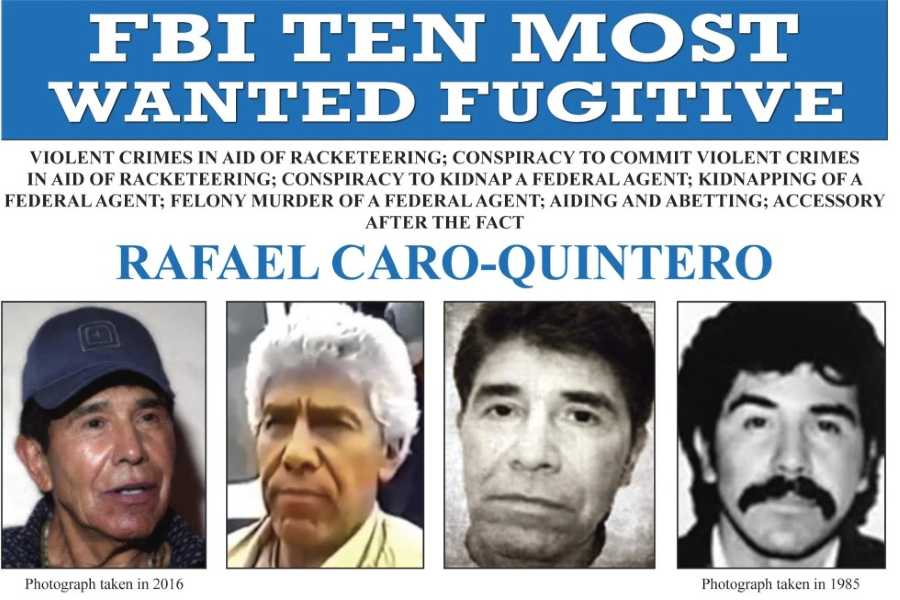U.S. Weighs Death Penalty for Mexican Drug Lord Caro Quintero Decades After DEA Agent's Murder
Prosecutors given 90 days to seek capital punishment for Rafael Caro Quintero following extradition and Brooklyn court appearance; Case holds deep symbolic weight for U.S. law enforcement after 1985 killing of Enrique 'Kiki' Camarena.

Decades after the brutal murder of a U.S. federal agent sent shockwaves through U.S.-Mexico relations, notorious Mexican drug lord Rafael Caro Quintero appeared in a Brooklyn federal court Friday, marking a pivotal moment in a long and complex pursuit of justice. Now, U.S. prosecutors face a weighty decision: whether to seek the death penalty against the man widely blamed for the 1985 kidnapping, torture, and killing of DEA Special Agent Enrique "Kiki" Camarena.
Following Caro Quintero's recent extradition from Mexico, prosecutors in the Eastern District of New York confirmed they are considering capital punishment. During the initial hearing before Judge Frederic Block, Assistant U.S. Attorney Saritha Komatireddy stated that the death penalty "is a possibility." The prosecution team has been granted 90 days, until late July, to formally declare its intention, a move that would require authorization from U.S. Attorney General Merrick Garland.
Caro Quintero, 72, looking pale and thin according to observers, pleaded not guilty to a sweeping indictment that includes charges of leading a continuing criminal enterprise, conspiracy to murder a federal agent, kidnapping, torture, drug trafficking, and firearms offenses. Often dubbed the "narco of narcos," he was a founder of the powerful Guadalajara Cartel, which dominated drug routes into the U.S. during the 1980s.
The case revolves around the abduction and murder of Agent Camarena in Guadalajara, Mexico. Camarena was investigating the cartel's vast marijuana operations when he was kidnapped, interrogated under torture for over 30 hours, and ultimately killed. His death became a defining moment for the U.S. Drug Enforcement Administration, galvanizing the agency and significantly straining diplomatic ties with Mexico, which was accused by U.S. officials of hindering the investigation and protecting cartel figures.
Caro Quintero was arrested in Costa Rica shortly after the murder in 1985 and convicted in Mexico. However, in a move that stunned and angered U.S. officials, he was released from a Mexican prison in 2013 on a legal technicality after serving 28 years of a 40-year sentence. He subsequently vanished, returning to the top of the DEA's most-wanted list with a $20 million reward offered for his capture. His recapture by Mexican marines last July paved the way for his extradition this week.
The significance of Caro Quintero's appearance on U.S. soil was underscored by an unusual display outside the Brooklyn courthouse. Roughly twenty DEA agents, identified as belonging to the group associated with Agent Camarena, posed solemnly for cameras on the courthouse steps after the hearing concluded.
"No matter how much time passes or how long one hides, the DEA continues its patient and committed pursuit globally of individuals who bring violence and destruction to our communities," said Frank Tarentino, the DEA Special Agent in Charge heading the case, according to the provided source material. He emphasized the agency's determination to "see justice done," calling Caro Quintero "one of the most evil cartel bosses."
For the DEA, bringing Caro Quintero to trial in the U.S. represents the culmination of a nearly 40-year institutional commitment. Agency officials have repeatedly stated that they never forgot the "savage assassination" of one of their own. The prosecution is seen not just as holding an individual accountable, but as fulfilling a solemn promise to a fallen colleague.
Legal Hurdles and Conditions
Seeking the death penalty, while legally permissible for the murder of a federal agent, may face complexities. Mexico constitutionally opposes capital punishment and often seeks assurances that extradited individuals will not face execution. While Caro Quintero was extradited, the specific terms agreed upon between the U.S. and Mexico could potentially influence the sentencing phase, though U.S. prosecutors now have the final word on pursuing the ultimate penalty. The federal death penalty was abolished in New York state, but federal capital charges can still be brought.
Reflecting the high security risk and the gravity of the charges, Caro Quintero is being held under strict Special Administrative Measures (SAMs). These typically involve near-total isolation – reportedly 23 hours a day in his cell – and severely restricted, monitored communication with the outside world, including his defense team.
The Eastern District of New York is no stranger to high-profile cartel cases. It was the venue for the trial and conviction of Joaquín "El Chapo" Guzmán, former leader of the Sinaloa Cartel, and is where proceedings against Ismael "El Mayo" Zambada, another legendary cartel figure, are pending.
The decision facing Attorney General Garland and the Brooklyn prosecutors in the coming weeks will determine the ultimate stakes in what promises to be one of the most significant international drug trafficking and murder trials in recent U.S. history – the final legal reckoning for a crime that has haunted U.S. law enforcement for generations.




